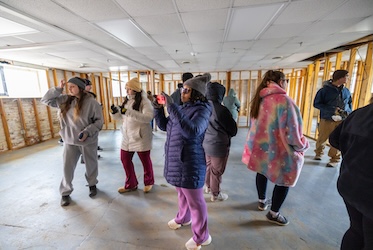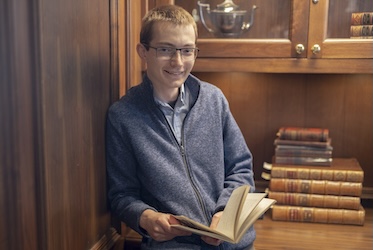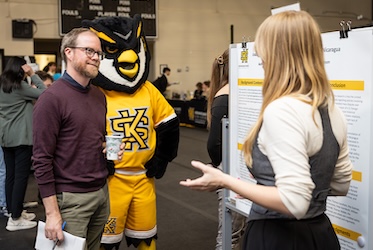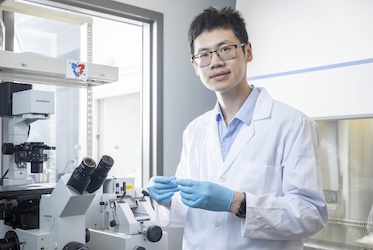
Kennesaw State students participate in first Posters at the Georgia State Capitol
KENNESAW, Ga. | Mar 27, 2019
New event brings undergraduate research under the Gold Dome

Four Kennesaw State undergraduate researchers presented their research projects Wednesday during the first Posters at the Georgia State Capitol, an event for undergraduate researchers to share their scholarly works with state government officials. Their projects are among the 41 selected to debut under the Gold Dome.
The KSU undergraduate researchers – Trae Dunn, Olivia Lauzon, Niko Giannakakos and Trevor Warnix – shared their projects in biology, psychology and mechanical engineering, respectively, from 2 to 4 p.m. at the Georgia State Capitol.
Sponsored by the Georgia Undergraduate Research Collective, this new annual event provides a public space for university students across Georgia to showcase their research, and any student enrolled in a public or private university/college in Georgia may apply to participate in this special poster session.
“I am so proud of these students as they will be able to share their work at the state level,” said Amy Buddie, director of KSU’s Office of Undergraduate Research. “This event, similar in nature to Posters on the Hill in Washington, D.C., is a wonderful opportunity for our students to not only interact with state government leaders, but also highlight how their research can benefit all Georgians.”
Dunn, a sophomore biology major from Alpharetta, said that making an impact through research to improve a person’s quality of life is what motivates him when working in the neurobiology lab at KSU.
“The real reason I want to be a neurologist is that I want to be able to actively search for ways to treat neurodegenerative diseases such as Alzheimer’s, which does not have a cure or treatment for slowing its progression,” said Dunn.
His current research focuses on the molecular mechanisms behind disorders such as epilepsy to better understand how genes are mutated to produce these abnormalities that affect the central nervous system.

“Using a worm model, we are studying how one gene that is similar to a gene that is associated with type II diabetes in humans controls another gene that has been associated with another gene in humans that plays a role in the development of the retina,” he said.
Similarly, Lauzon, a senior from LaGrange, is looking at human health from a psychological perspective. She is presenting her research on the influence of hormones and hormonal contraceptives on emotion regulation.
“Women are two times more likely to be diagnosed with an anxiety disorder than men,” she explained. “With deficits of emotion regulation being a characteristics of anxiety disorders, it is important to understand potential biological mechanisms that could be creating this disparity.”
Lauzon, who credits her involvement in undergraduate research to her faculty mentor Ebony Glover, was the first KSU student to participate in Posters on the Hill last spring with other students from around the country.
“I think the value of undergraduate research is internal and immeasurable,” she said. “I am contributing to the potential and opportunity for discoveries to be made and theories and trends to be investigated.”
On the other side of the spectrum, mechanical engineering majors Giannakakos and Warnix are exploring ways to improve a helicopter’s swashplate, a mechanism that transfers the input from the pilot into the motion of the helicopter’s main rotating blades. They are using a remote-control helicopter as the model for creating a jointless swashplate mechanism that would be more efficient than the standard design.
“We have a mathematical model, a physical model created from 3-D printing and we are also using computer software in our analysis,” said Giannakakos, a senior from Nanuet, N.Y. “This type of experience employs what I have learned in the class and expands my knowledge base into what I hope I will be doing for the rest of my engineering career.”
Warnix, who is from Dalton and will graduate in May, added, “As we are working together, we are pushing ourselves and each other in figuring out the answer. It makes both of us better in the end, which is really good for research like this because that is what you want.”
–Joëlle Walls
Related Stories

Kennesaw State architecture, engineering students reimagine Asheville's devastated River Arts District

First-year Kennesaw State student, author recognized as versed local historian

Kennesaw State students to present research at Symposium of Student Scholars

KSU researcher harnessing digital twin technology to improve heart care
A leader in innovative teaching and learning, Kennesaw State University offers undergraduate, graduate, and doctoral degrees to its more than 47,000 students. Kennesaw State is a member of the University System of Georgia with 11 academic colleges. The university’s vibrant campus culture, diverse population, strong global ties, and entrepreneurial spirit draw students from throughout the country and the world. Kennesaw State is a Carnegie-designated doctoral research institution (R2), placing it among an elite group of only 8 percent of U.S. colleges and universities with an R1 or R2 status. For more information, visit kennesaw.edu.














